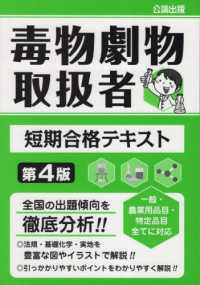- ホーム
- > 洋書
- > 英文書
- > History / World
Full Description
In the spring of 1969, hundreds of workers, all Black and mostly female, went on strike at Medical College Hospital and Charleston County Hospital to protest racial discrimination, low wages, and the marginalization of their dignity. The movement began with an incident of wrongful termination in 1967 involving five Black women at Medical College Hospital that uncovered the pervasiveness of racial and economic discrimination at both hospitals. The termination sparked outrage among other hospital workers who, with support from local community leaders, organized a movement that galvanized the city, state, and nation.
We Paved the Way: Black Women and the Charleston Hospital Workers' Campaign explores this campaign in the context of a broader protest tradition, revealing it to be a full-scale movement that demonstrates the power and complexity of Black women's activism in the mid-twentieth century. O. Jennifer Dixon-McKnight argues that the experiences of the women at the center of this conflict offer a window into the plight of Southern Black working-class women and the ways in which they fought for equality, access, and well-being.
Though much of what has been written about the hospital workers' campaign focuses on the strike through an institutional lens, Dixon-McKnight uses extensive interviews and oral history to expand the scope of existing scholarship. Local leaders such as Septima Clark, Esau Jenkins, William Saunders, and Isaiah Bennett served as bridge builders for the Black community's involvement in protest, which helped shape and nurture the hospital workers' campaign. By discussing the grassroots organizing that sparked the strike and tracing the aftermath of the conflict, including what workers experienced in their return to work and their relationships with the Southern Christian Leadership Conference and Local 1199 Hospital and Nursing Home Employees Union, this volume situates the hospital workers' movement as a critical moment in the nation's long civil rights history.
Contents
Acknowledgments
Introduction
Chapter 1—Charleston's Local Protest Tradition
Chapter 2—Hospital Workers and Health-Care Activism
Chapter 3—"Union Power"
Chapter 4—"Soul Power"
Chapter 5—Respectable and Disorderly
Chapter 6—"McNair Fiddles While Rome Burns"
Chapter 7—Resolution and Disillusion
Conclusion
Notes
Bibliography
Index






